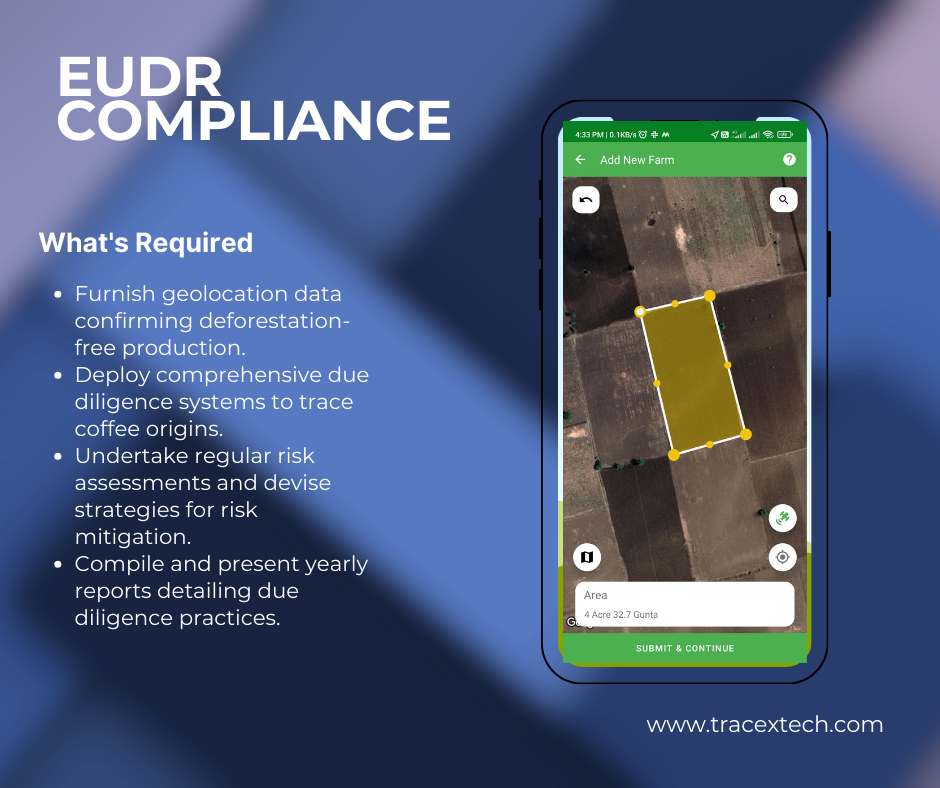Contact: +91 99725 24322 |
Menu
Menu
Quick summary: Explore the Impact of the EU Deforestation-Free Regulation (EUDR) on Coffee Supply Chains. Learn how this initiative shapes a sustainable, deforestation-free future for your daily cup of coffee.

In the heart of every cup of coffee lies a story—a tale of exotic origins, cultural richness, and a journey from tree to mug. But behind the aromatic allure and enticing flavors, there’s often a hidden chapter that the average coffee drinker seldom contemplates: the impact on our planet’s precious forests. In a world increasingly conscious of its environmental footprint, the quest for deforestation-free coffee supply chains has become a rallying cry for change.
Coffee production is estimated to drive around 100,000 hectares of deforestation globally every year.
Forests are vital, but deforestation threatens them. If you’re passionate about protecting our forests and promoting deforestation-free supply chains, you’re not alone. Discover how TraceX traceability solutions are transforming the fight against deforestation. In this blog, you’ll learn how cutting-edge technology is making it possible to ensure your supply chains are deforestation-free.
Deforestation-free coffee supply chains are systems in which the cultivation and production of coffee are managed to prevent the clearing of forests for coffee farming. These supply chains prioritize sustainable and environmentally responsible practices, ensuring that coffee production does not contribute to deforestation or ecosystem destruction.
Growing global awareness of environmental sustainability in coffee production is driven by concerns about deforestation, climate change, and biodiversity loss. Consumers, producers, and governments are increasingly demanding eco-friendly practices, promoting shade-grown coffee, reforestation, and reduced chemical use to protect ecosystems and ensure a more sustainable future for the coffee industry. The European Union Deforestation Regulations (EUDR) objective is to reduce deforestation and forest degradation practices in the supply chains of products entering the EU market. While the regulation does not outright ban commodities or raw materials from specific countries, it mandates that companies introducing products to the EU market must conduct due diligence to assess risks within their supply chain.
Traditional sun-grown coffee farming, while widely practiced, can have negative impacts. It often leads to deforestation, loss of biodiversity, and soil degradation. The reliance on full sun exposes coffee plants to pests and reduces their resilience to climate change. Sustainable alternatives like shade-grown coffee are being promoted to mitigate these environmental consequences.
Deforestation is a common practice to clear land for coffee cultivation. Trees are often removed to make way for coffee plantations, leading to habitat destruction, loss of biodiversity, and increased carbon emissions. This harmful trend highlights the need for sustainable and eco-friendly coffee production methods to preserve ecosystems and combat climate change.
Forests are vital for biodiversity as they provide diverse habitats for countless species of plants, animals, and microorganisms. They support complex ecological networks, enhance genetic diversity, and serve as a source of food, shelter, and breeding grounds for numerous organisms. Forest conservation is crucial for maintaining global biodiversity.
Deforestation disrupts forest ecosystems by causing habitat loss, altering climate patterns, and increasing carbon emissions. It results in the extinction of species, disrupts ecological balance, and threatens biodiversity. Deforestation also reduces the ability of forests to sequester carbon and regulate local and global climate, leading to environmental instability.
Deforestation is a significant source of carbon emissions. When forests are cleared or burned, the carbon stored in trees and soil is released into the atmosphere as carbon dioxide. This contributes to global warming, climate change, and environmental instability, highlighting the urgent need for forest conservation and sustainable land use practices.
Coffee is intricately linked to climate change. Rising temperatures and unpredictable weather patterns can harm coffee crops by increasing pests and diseases. Shifts in traditional coffee-growing regions affect the industry and livelihoods. Sustainable practices, like shade-grown coffee and carbon-neutral initiatives, are crucial for adapting to and mitigating climate impacts.
Deforestation has a detrimental effect on watersheds and water quality. It disrupts natural water filtration processes, leading to soil erosion and increased sediment in water bodies. Additionally, it can introduce pollutants, harming aquatic ecosystems and reducing the availability of clean water, impacting both the environment and human communities downstream.
Deforestation-free coffee cultivation practices benefit both coffee production and local communities. Sustainable coffee farming protects ecosystems, ensures long-term crop viability, and supports biodiversity. This, in turn, secures livelihoods, enhances food security, and promotes a healthier environment, fostering social and economic well-being in coffee-growing regions.
Deforestation negatively impacts local communities by disrupting their traditional way of life and access to resources. It can lead to soil degradation, loss of biodiversity, and reduced water quality, affecting agriculture, food security, and livelihoods. Additionally, deforestation can displace indigenous people and exacerbate social inequalities.
The ethical and social responsibility of coffee production involves ensuring fair wages and working conditions for farmers, protecting natural ecosystems, and supporting local communities. It aims to address issues like child labor, gender equality, and sustainable farming practices, fostering a more equitable and environmentally responsible coffee industry.
Shade-grown and agroforestry coffee methods play a crucial role in preserving biodiversity. These practices provide a diverse canopy of trees, creating habitats for wildlife, supporting pollinators, and maintaining ecological balance. By mimicking natural forest ecosystems, they safeguard biodiversity while sustaining coffee production.
Supporting bird-friendly and wildlife-friendly coffee initiatives involves endorsing farming practices that preserve biodiversity. These initiatives encourage shade-grown, organic, and pesticide-free coffee cultivation, creating habitats for birds and wildlife. By choosing such coffee, consumers and producers promote ecological conservation and sustainable agricultural methods that benefit both nature and coffee quality.
Carbon sequestration in forested coffee landscapes is the process of capturing and storing carbon dioxide in trees, soil, and vegetation. This contributes to climate change mitigation and environmental sustainability by offsetting carbon emissions and promoting healthier ecosystems within coffee farming regions.
Sustainable practices to reduce carbon emissions include transitioning to renewable energy sources, improving energy efficiency, promoting public transportation and carpooling, implementing afforestation and reforestation projects, and adopting eco-friendly agriculture methods such as no-till farming and agroforestry. These efforts mitigate climate change and support a greener, more sustainable future.
Maintaining healthy watersheds is crucial as they serve as natural filters and regulators of freshwater. Healthy watersheds ensure clean and reliable water sources, support diverse ecosystems, and mitigate floods and droughts. They are vital for both environmental sustainability and human well-being, emphasizing the need for their preservation.
Water-friendly coffee cultivation practices aim to reduce water pollution and promote efficient water use. These practices involve implementing erosion control measures, using organic farming methods, and minimizing chemical inputs. By safeguarding water quality and quantity, water-friendly approaches support sustainable coffee production and protect surrounding ecosystems.
To address the challenges of promoting sustainable consumption, Voluntary Sustainability Standards (VSS) have emerged as effective tools for enhancing transparency and instilling trust in sustainability-related product characteristics. They play a significant role in encouraging sustainable consumer behaviour.
Notable examples of VSS in the coffee industry include well-known programs like Fairtrade,
Rainforest Alliance, and Organic certifications, all of which aim to improve the conditions within coffee production practices. They emphasize the coordination and regulation of sustainability aspects in global coffee production.
These standards rely on third-party auditing and increasingly leverage technologies such as satellite imagery and remote sensing, especially in monitoring and enforcing compliance within deforestation areas
Existing certification programs have made substantial strides in enhancing the sustainability of coffee supply chains. They’ve helped raise awareness and improve certain practices, such as fair labour conditions and organic farming. However, these programs have limitations. Many focus primarily on environmental or social aspects, potentially neglecting one dimension at the expense of the other. Additionally, the credibility and rigor of some certifications have been questioned, with concerns about “greenwashing,” where companies may overstate their commitment to sustainability.
To truly promote sustainable coffee supply chains, there is a growing consensus on the need for more rigorous and comprehensive standards. These should encompass a broader spectrum of sustainability aspects, including environmental, social, and economic factors. Stringent standards could address the shortcomings of current certifications, setting clear expectations and demanding verifiable, measurable, and impactful practices.

Traceability encompasses the capability to monitor and record the source and progression of products or components across the supply chain. This entails collecting comprehensive data at every step of manufacturing, processing, and distribution.
TraceX employs blockchain technology to bolster data security, integrity, and transparency while tackling these issues. It simplifies data exchange, cuts down expenses, optimizes intricate supply chains, and guarantees data precision, all of which are essential factors in achieving EUDR compliance efficiently and sustainably.
TraceX traceability software that provides reliable and verifiable sustainability data to fulfill your compliance and reporting requirements.
In conclusion, the journey towards deforestation-free coffee, driven by the EU Deforestation-Free Regulation (EUDR), is an ambitious but necessary endeavor. It’s about much more than just a hot cup of coffee; it’s a testament to our commitment to safeguarding our planet’s forests, biodiversity, and the livelihoods of countless smallholder coffee farmers. The EUDR represents a pivotal step towards aligning consumer choices with sustainable and ethical coffee sourcing. With collaboration, innovation, and a shared sense of responsibility, we can raise our coffee mugs, knowing that each sip supports a future where coffee is not only a morning ritual but a force for positive change.
